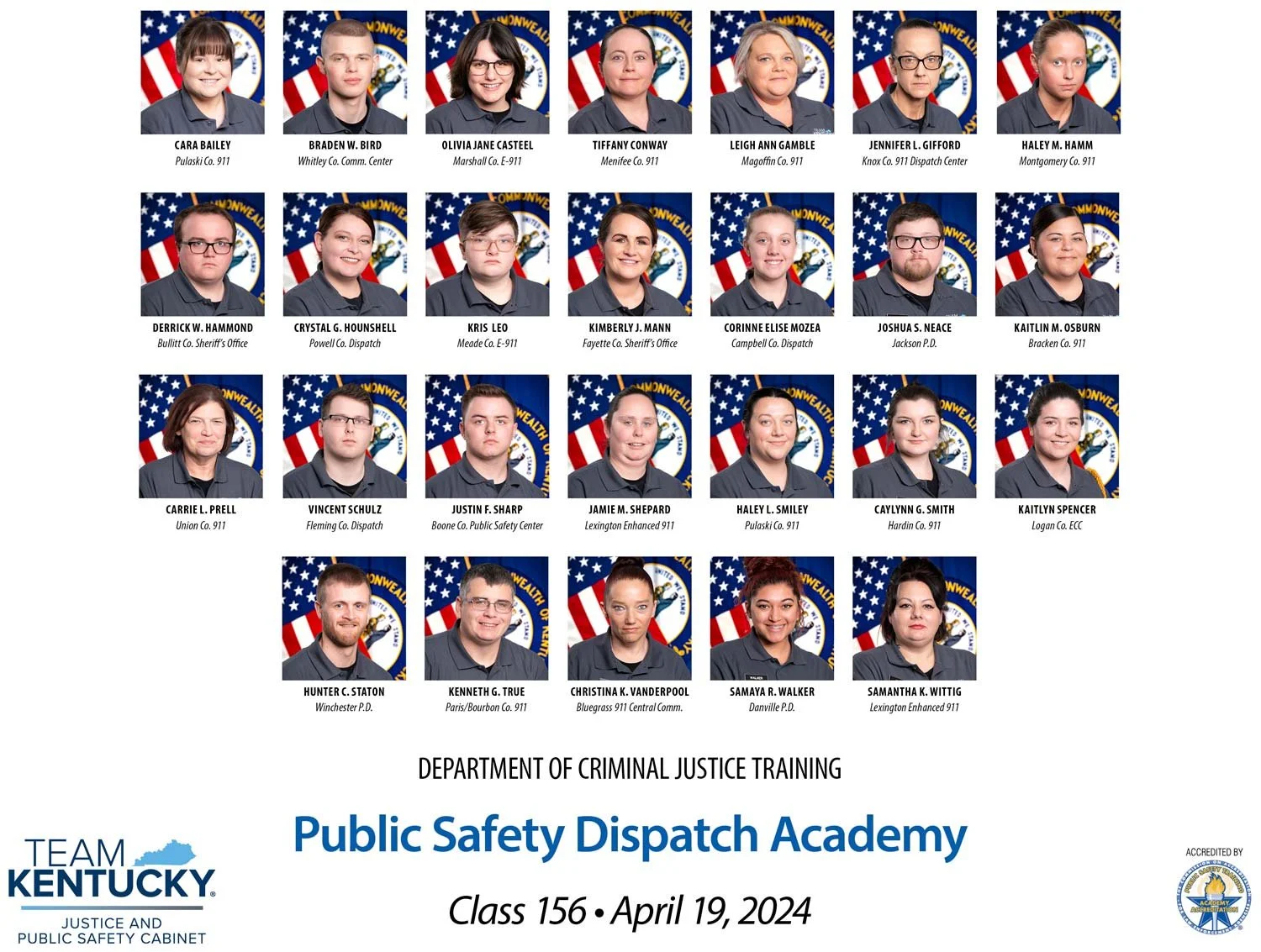Gov. Beshear, Department of Criminal Justice Training Announces 26 Graduates of Public Safety Dispatch Academy Class 156
On April 19, Gov. Andy Beshear and the Kentucky Department of Criminal Justice Training (DOCJT) announced that 26 dispatchers from across the state graduated from the Public Safety Dispatch Academy and are now ready to begin answering the call to aid both citizens and law enforcement officers of the commonwealth.
“Your commitment to your community and the commonwealth is honorable,” Gov. Beshear said. “You are the lifeline to those who are experiencing the toughest moments of their lives. I applaud you for your decision to pursue this profession.”
Dispatch basic training is mandatory for any sworn or civilian employee who will dispatch law enforcement officers by radio at a Criminal Justice Information Systems agency. Graduates of the academy have successfully completed a highly structured and comprehensive curriculum to satisfy mandated training requirements. The graduates of Class 156 received 164 hours of academy instruction to satisfy these requirements over four weeks. Major training areas included identifying the role and responsibilities of the dispatcher, correcting phone and radio procedures, handling emergency and non-emergency calls for service, using emergency medical dispatch protocols and using the state and national criminal databases.
“Choosing to become a member of this time-honored profession is admirable,” said DOCJT Commissioner Nicolai Jilek. “It requires the utmost professionalism and perseverance. We wish you the best of luck in your careers.”
DOCJT is a state agency located on the campus of Eastern Kentucky University. The agency is the first in the nation to be accredited under the Commission on Accreditation for Law Enforcement Agencies’ public safety training program designation.
Class 156 graduates and their agencies are:
Cara Bailey
Pulaski Co. 911
Braden W. Bird
Whitley Co. Comm. Center
Olivia Jane Casteel
Marshall Co. E-911
Tiffany Conway
Menifee Co. 911
Leigh Ann Gamble
Magoffin Co. 911
Jennifer L. Gifford
Knox Co. 911 Dispatch Center
Haley M. Hamm
Montgomery Co. 911
Derrick W. Hammond
Bullitt Co. Sheriff’s Office
Crystal G. Hounshell
Powell Co. Dispatch
Kris Leo
Meade Co. Dispatch
Kimberly J. Mann
Fayette Co. Sheriff’s Office
Corinne Elise Mozea
Campbell Co. Dispatch
Joshua S. Neace
Jackson P.D.
Kaitlin M. Osburn
Bracken Co. 911
Carrie L. Prell
Union Co. 911
Vincent Schulz
Fleming Co. Dispatch
Justin F. Sharp
Boone Co. Public Safety Center
Jamie M. Shepard
Lexington Enhanced 911
Haley L. Smiley
Pulaski Co. 911
Caylynn G. Smith
Hardin Co. 911
Kaitlyn Spencer
Logan Co. ECC
Hunter C. Staton
Winchester P.D.
Kenneth G. True
Paris/Bourbon Co. 911
Christina K. Vanderpool
Bluegrass 911 Central Comm.
Samaya R. Walker
Danville P.D.
Samantha K. Wittig
Lexington Enhanced 911
DOCJT provides basic training for city and county police officers, sheriffs’ deputies, university police, airport police throughout the state, only excluding Louisville Metro Police Department, Lexington Police Department, Bowling Green Police Department and the Kentucky State Police, which each have independent academies.
DOCJT is nationally accredited by the Commission on Accreditation for Law Enforcement Agencies (CALEA). CALEA is seeking public input regarding DOCJT’s compliance with CALEA standards, engagement in the service community, delivery of public safety services, and overall candidacy for accredited status. Click here to submit comments.
Beshear-Coleman Administration Commitment to Making Kentucky a National Leader in Public Safety
The Beshear-Coleman administration’s top priority is the safety of all Kentuckians. The Governor's public safety actions are creating safer communities and a better Kentucky now and into the future.
DOCJT provides basic training for city and county police officers, sheriffs’ deputies, university police, airport police throughout the state, only excluding Louisville Metro Police Department, Lexington Police Department, Bowling Green Police Department and the Kentucky State Police, which each have independent academies.
The Beshear-Coleman administration’s top priority is the safety of all Kentuckians. The Governor's public safety actions are creating safer communities and a better Kentucky now and into the future.
In December, the Governor announced the Forward, Together budget proposal which will continue boosting public and officer safety. The proposed budget includes a $2,500 raise for all KSP troopers and officers and enough funding to add 150 more troopers over the next two years. This raise follows the $18,800 raise Gov. Beshear secured for all troopers and officers during the previous budget session. Gov. Beshear’s budget also includes increasing the law enforcement training stipend yet again, improving the pension system for state and local law enforcement and grant funding for local law enforcement agencies to purchase body armor.
Since taking office, Gov. Beshear has awarded more than $10 million in grant funding to assist state and local law enforcement agencies in purchasing the tools and resources that will not only allow them to protect Kentucky communities but will also ensure their safety as they stand on the front lines every day. In August, the administration awarded $2.1 million in grant funding to enhance public safety, curb the sale of illegal drugs and fight addiction.
In July 2023, Gov. Beshear broke ground in Richmond on a new law enforcement training facility named in honor of Jody Cash, who lost his life in the line of duty May 16, 2022, while serving as chief deputy of the Calloway County Sheriff’s Office. Members of the Cash family, as well as state and local officials and staff from the Department of Criminal Justice Training, joined the Governor in taking a step forward to enhance the safety of Kentucky’s nearly 8,000 peace officers who risk their lives every day to protect Kentucky families.
In June 2022, Gov. Beshear announced the Military to Law Enforcement Program (M-2-LE). M-2-LE allows local law enforcement agencies in Kentucky to hire active service members within all U.S. military branches during their last 180 days of service. Upon being contracted by a law enforcement agency, the military member will continue to receive their pay and benefits from the U.S. Military while they undergo law enforcement training at the Department of Criminal Justice Training.






